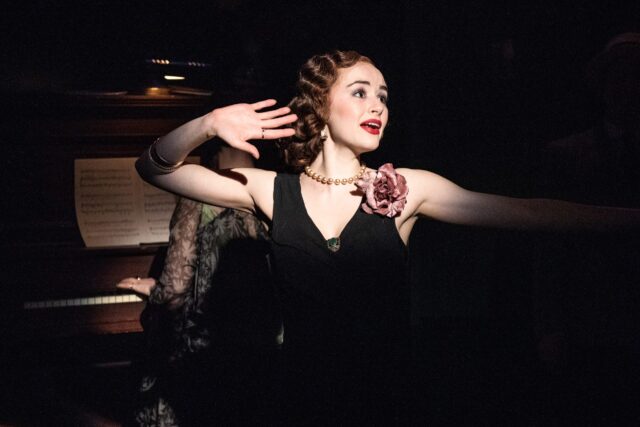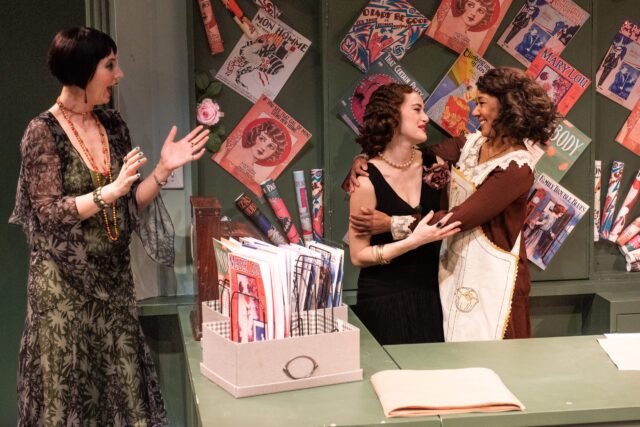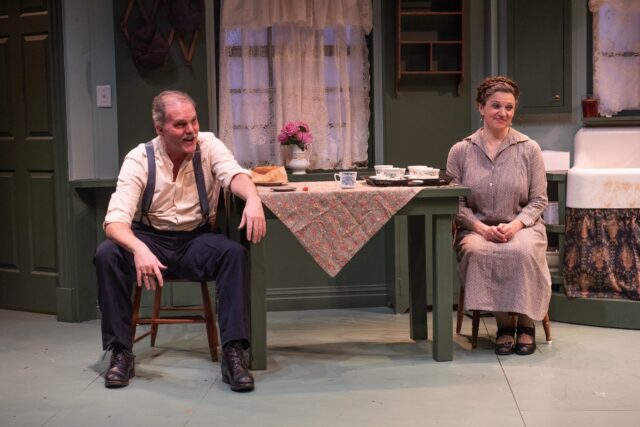
Emma Pfitzer Price shines in the Mint’s world premiere of Becomes a Woman (photo by Todd Cerveris)
BECOMES A WOMAN
Mint Theater at New York City Center Stage II
131 West 55th St. between Sixth & Seventh Aves.
Tuesday – Sunday through March 18, $45-$90
minttheater.org
nycitycenter.org
There was something extra special about opening night at the Mint’s world premiere of Becomes a Woman, written by Betty Smith, the Williamsburg-born novelist and author most famous for the semiautobiographical 1943 bestseller A Tree Grows in Brooklyn. Smith’s hundred-year-old daughter, Nancy Jean, was in attendance, sitting in the first row at New York City Center Stage II.
Equally remarkable was that this excellent play, written in 1931, has never before been produced, anywhere. It is the Mint’s mission to resurrect long-lost plays, and this show, under Britt Berke’s loving, caring direction, is a sparkling gem that takes on feminist issues well ahead of its time, in intelligent, well-developed ways.
In her off-Broadway debut, Emma Pfitzer Price shines as nineteen-year-old Francie Nolan, who sings popular songs in Kress’s five-and-dime store on DeKalb Ave. Although the character shares the same name as the protagonist of A Tree Grows in Brooklyn, there are few other similarities. (The store is also a fictionalized version of the actual Kress’s.) This Francie lives in an Irish neighborhood in Bushwick with her tough-talking father, a city cop (Jeb Brown); her old-fashioned mother (Antoinette Lavecchia), who spends most of her time cooking and cleaning; and her two teenage brothers, Frankie (Tim Webb) and Johnny (Jack Mastrianni), who are ready to quit school and start working, against their mother’s wishes.
“You’re going to keep on going to school. As long as your father has a good job and Francie keeps on working, my children are going to get a good education,” Ma Nolan tells them. “Now, Francie went to high school for two years. She wanted to go longer but two years is enough for a girl. She didn’t mind the scales. She practiced. That’s why she’s earning such good money as a musician today.”

Florry (Pearl Rhein), Francie (Emma Pfitzer Price), and Tessie (Gina Daniels) work together in a five and dime (photo by Todd Cerveris)
Wearing a sexy black nightclub dress, Francie sings popular tunes, accompanied by the sassy Florry (Pearl Rhein) on piano, in an effort to sell the sheet music. But it turns out that nearly all the men who ask to hear a song are more interested in going out with Francie, who refuses to date customers or “strange men.” She’s tired of hearing them say, one after another, “Are you doing anything tonight, baby?” To which she regularly answers, “Yes I am. And I’m busy every other night this week too. And next week.”
Among the songs Francie sings are “Left Alone,” “Me and My Family Blues,” “He’s My Man,” and “I Don’t Owe Nothing to Nobody,” titles that get to the heart of her character; dramaturg Amy Stoller created a music playlist that can be heard here.
Florry believes that Francie is a scared little mouse who should assert herself more and take chances to get a man. “She’s the kind that just tempts people to pick on her. She’s so afraid of everything,” Florry tells the older Tessie (Gina Daniels), who works the register and is in charge of the flowers. “She never fights for a seat in the trolley going home. I never have to stand.”
Francie is being wooed by taxi driver Jimmy O’Neill (Christopher Reed Brown), who fails to thrill her. But when the dashing and handsome Leonard Kress Jr. (Peterson Townsend), son of the chain owner (Duane Boutté), shows a liking for her, she starts dreaming of a better future.

Pa and Ma Nolan (Jeb Brown and Antoinette Lavecchia) have issues with their daughter in Betty Smith play (photo by Todd Cerveris)
“He’s different. I know he is. I know he’s not the doing-anything-tonight-baby kind. I’d hate him if he was like that,” Francie says. “What do you want a man to do? Worship you from a cloud?” Florry asks. “No, but I want a man to decide whether he likes me before he spends an evening with me and not after,” Francie explains. “Men ain’t made that way. A girl has to really like a man before she gets intimate with him but a man has to get really intimate with a girl before he likes her. Anybody will tell you that,” the cynical Florry says. “That’s not true. It can’t be true,” Francie insists.
Finally putting herself out there, Francie discovers that more of it is true than she ever imagined. But instead of wilting like a dying flower, she decides to take control of her situation, which presents a whole new set of challenges.
As with the best Mint shows, Becomes a Woman is exquisitely rendered, its two hours (with two intermissions) beautifully paced by Berke in her outstanding off-Broadway debut. Vicki R. Davis’s sets morph from the elegant Kress store to the plain and sensible Nolan home, which undergoes an important change after the second act. Emilee McVey-Lee’s effective period costumes range from the Kresses’s sharp suits to Ma Nolan’s frumpy house wear, Pa Nolan’s practical suspenders, and Florry’s long, flirty dresses. Mary Louise Geiger’s lighting and M. Florian Staab’s sound keep the audience immersed in the proceedings.
Juilliard graduate Price is a revelation as Francie, fully embodying the eminently likable character’s transformation from frightened wallflower doing whatever her parents tell her to into a strong young woman making her own decisions about her body and her life, not all of which end up the way she wants. Daniels (Network, All the Way) is wonderful as Tessie, Francie’s friend and mentor who has overcome her difficult past with the help of her charming boyfriend who always finds the goodness in situations, ambulance driver Max, played by a scene-stealing Jason O’Connell (Pride and Prejudice, The Dork Night).

The fancy Leonard Kress Jr. (Peterson Townsend) woos Francie (Emma Pfitzer Price) in Becomes a Woman (photo by Todd Cerveris)
Townsend (Chains, Fire Shut Up in My Bones) and Boutté (Parade, Carousel) excel as father and son, each offering surprises as Smith’s plot evolves. The fine cast also features Jillian Louis, Scott Redmond, Madeline Seidman, and Phillip Taratula.
Smith, who wrote such other plays as Sawdust Heart and So Gracious Is the Time and such other novels as Tomorrow Will Be Better and Joy in the Morning — as well as the book, with George Abbott, for the 1951 Broadway musical adaptation of A Tree Grows in Brooklyn — died in 1972 at the age of seventy-five and never saw Becomes a Woman onstage. More than fifty years later, her daughter got to witness this splendid play, a prescient exploration of a young woman’s coming of age that is not dated in the least; sadly, much of it is all too relevant today.
In a program essay by scholar, teacher, and historian Maya Cantu, Smith is quoted as saying, “A hundred years after I’m dead, people will still be reading A Tree Grows in Brooklyn.” Hopefully, a hundred years from now, people will also still be going to the theater to experience Becomes a Woman.